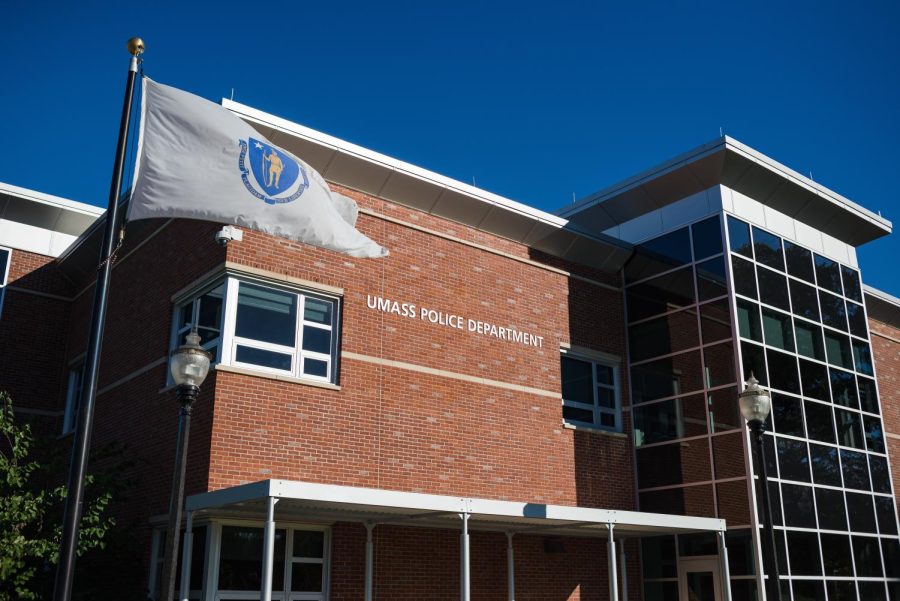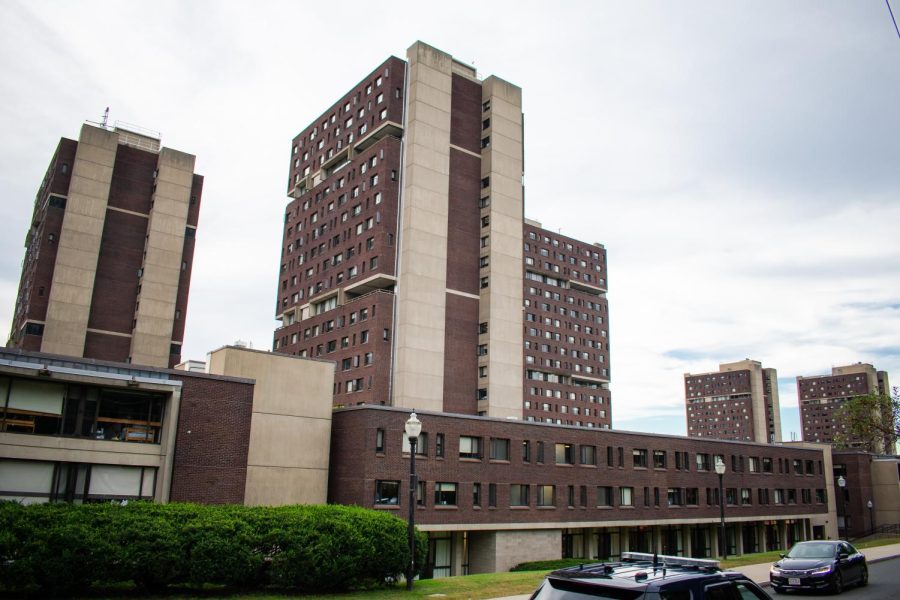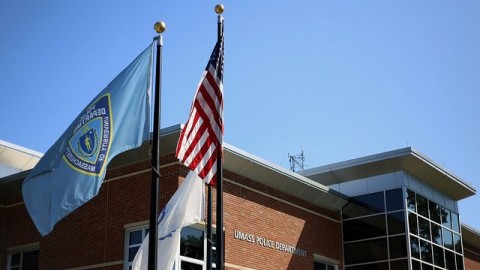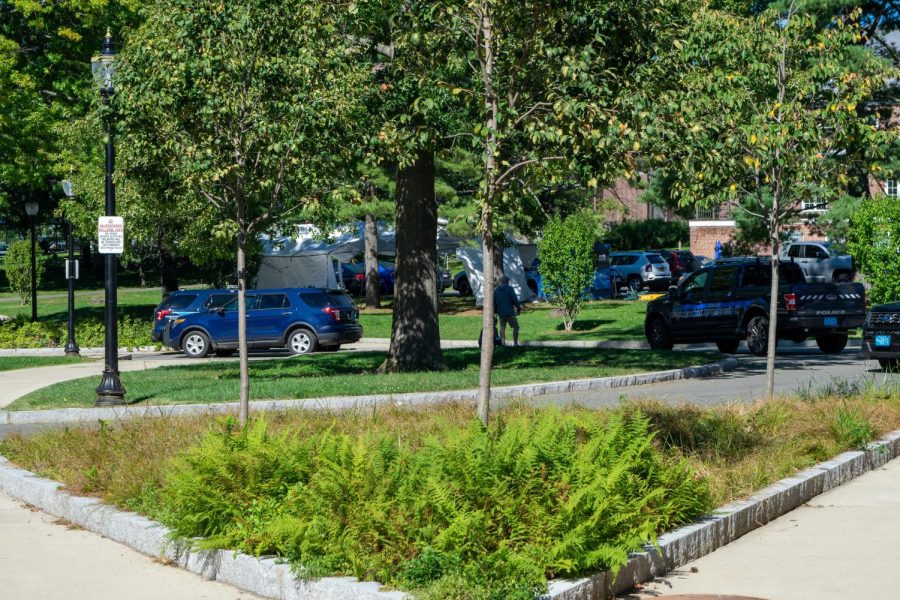
Former Boston Police Commissioner Ed Davis presented his report on crowd disturbances at the University of Massachusetts and in the town of Amherst Friday morning, six months after the town was overcome by drunken, unruly students during the annual “Blarney Blowout.”
“It was tough on people,” Davis said of the report, adding that the most critical eye was cast toward police response to the incident. Police, clad in riot gear, arrested 58 people during the pre-St. Patrick’s day celebration, using tear gas to break up large crowds that had gathered at several off-campus locations.
“Several factors contributed to the unorganized and traditional police response including the immense pressure, command confusion and premature use of chemical munitions to manage the behavior of the large crowds,” the report states.
Davis, however, acknowledged that Amherst and University police did an “incredible job responding to the incident” with the training and resources that they had. Furthermore, the report states, “Police had not faced a crowd of this magnitude in previous, planned and unplanned events in Amherst.”
“Ten years ago, I would have done exactly what Amherst police did,” Davis said.
The report outlines specific guidelines for preparing town and campus police for incidents like this in the future, including clear coordination and communication about plans, increased staffing, especially within the Amherst police department, better community policing and providing adequate resources. The report specifically mentioned that the departments should “enhance their utilization of both covert and overt video cameras” to help prevent “large-scale disorder.”
“It’s expensive to bring in extra police,” Davis said. “But it’s an insurance policy and that’s what I want to try to point out here.”
The report also highly suggested more training for APD and UMPD officers, with a focus on joint training between the two departments on crowd control, urban training, crowd dispersal and appropriate use of force in crowd situations.
Davis said the out-of-control incident occurred because of young people experimenting with alcohol – a national problem not unique to UMass.
”It’s a difficult problem. No one has solved this in the country,” he said. “There is no magic wand to stop that from happening.”
The report also highlighted the role social media played in escalating the incident.
“It’s very difficult to go about canceling something that’s planned by someone on social media,” Davis said. He added that if Amherst and UMass work together to discourage the event with the bars and place a ban on marketing “liquor-focused materials” such as t-shirts, it will at least help.
“Is it going to stop it completely? Probably not,” Davis admitted. “Is somebody going to say, ‘We’re going to have a Blarney Blowout’ next year on social media? Chances are they will.
“But if you start with that statement and you follow that other preventive action, more enforcement at the liquor stores, more enforcement the night before on the highways of people coming in, restricting the visitor policy, making sure there’s not a lot of alcohol on board inside the dormitories – all of those things together will lessen the impact.”
The report also outlines a number of key findings and recommendations for the town of Amherst and the University.
“Our primary goal is to suggest improved plans for the University and the Town for a holistic community response to large gatherings with a focus on prevention and de-escalation,” the report states.
Town Manager John Musante said that Amherst and UMass are committed to moving forward together, using the report as a road map. Musante said there needs to be a better relationship between the townspeople and the students of UMass, and the town will work on building that relationship.
“It is fundamentally important that we all use this report as a next step to build a more positive town and gown relations,” he said.
Musante and Chief of Amherst Police Scott Livingstone both said they are working with the bars to end the “Blarney Blowout” and any similarly sanctioned events, per Davis’s recommendation.
When asked about “Halfway to Blarney,” an event typically scheduled for mid-September, Livingstone was quick to assert that no such event would be happening.
“It’s not coming up at all,” he said with a smile. “I put an end to that. I’ve already had discussions … we have meetings today, later on today to go over anything we may anticipate for this weekend but I’ve already had direct communication with the bar owners and the liquor stores about what my expectations are promoting events like this.”
Livingstone, with Chief of UMass Police John Horvath, agreed that APD and UMPD did an “unbelievably good job” in March, but Livingstone was glad that Davis recommended hiring more Amherst police officers because that’s an issue he’s been concerned about for some time.
Davis’ report also suggested having an emergency operations center so all emergency personnel are involved in decision making during large-scale events. Livingstone said EOCs have been used during other events but there was no command center on March 8 due to the underestimation of this year’s “Blarney Blowout.”
“We made mistakes and we’ll correct them,” Livingstone said, but he added that on the day of the event, he was comfortable with the amount of force used and thought it necessary.
The University, too, is taking its own preventative measures.
Based on Davis’ recommendation, Chancellor Kumble Subbaswamy said the University will be expanding the UMatter at UMass campaign to “discourage bad behavior at social gatherings.” The campaign, launched last year, aims to convince students to actively care for each other and the community through being an active bystander.
Furthermore, Subbaswamy added that guest registration reforms will take place, including setting limits on number of visitors and implementing an electronic sign-in system, currently in use in about half the dorms on campus, which monitors the number of visitors in real time. All dorms on campus will be equipped with this system by fall 2015, he said.
“The main solution here lies with student self-policing,” Davis said.
The report was compiled by Edward Davis, LLC, a security and consulting firm founded by Davis after resigning from the Boston Police. Davis was assisted by Mark Delaney, Christine Cole, Daniel Linskey and Sharon Hanson.
Patrick Hoff can be reached at [email protected]. Aviva Luttrell can be reached at [email protected].
Read the full report:


















Adam Cameron • Sep 20, 2014 at 8:54 am
In my opinion, we should be demanding the resignation of whoever ordered “the premature use of chemical munitions.”